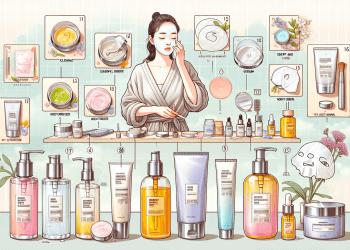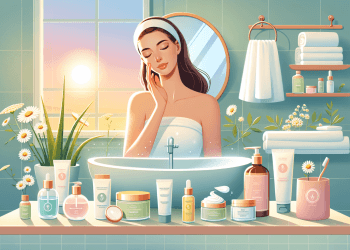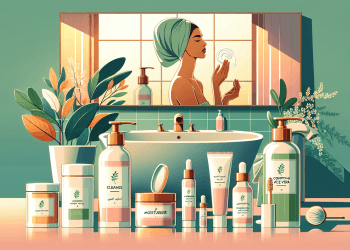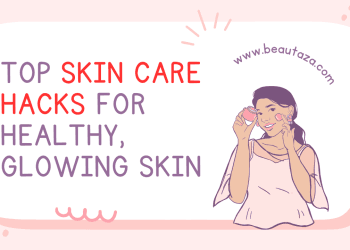
This blog article looks at Beauty Tips to Get Fresh Skin. Do you want young, glowing skin that radiates confidence and youth? Everybody wants their skin to be radiant and healthy, reflecting their inner beauty. Fortunately, it’s not an impossible ambition to achieve and keep flawless skin. You can rejuvenate your skin and improve your natural attractiveness with the correct beauty advice and techniques. We will explore numerous styles that will leave you with a complexion that emanates freshness and vigor, from thorough washing to feeding your skin from the inside. So let’s go on this adventure to revitalize your skin and realize your full beauty potential!
Beauty Tips to Get Fresh Skin – Cleanse Your Skin
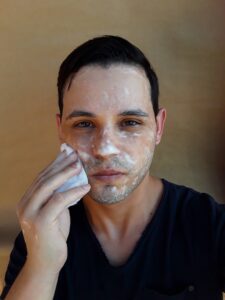
Getting young, fresh skin requires proper cleansing. Cleansing removes dirt, oil, and impurities that clog pores and dull skin. These tips ensure effective cleaning:
Start with a gentle cleanser for your skin type. Sulfates in strong soaps and cleansers may dry out your skin. Instead, choose a pH-balanced, non-toxic cleaner.
Cleanse your skin twice daily—morning and night. This keeps your skin care products clean and removes day-to-day buildup.
Instead of hot water, wash your face with lukewarm. Hot water may dry and irritate your skin.
Gently massage: Apply cleanser to your face in circular motions. This increases blood flow and ensures the cleaner penetrates pores.
Pay Special Attention to Problem Regions: When cleaning, focus on breakout-prone or oily areas. Then, scrub such spots again for comprehensive cleaning.
Permanently remove makeup before sleeping. All-night makeup may clog pores and create outbreaks. A mild makeup remover or micellar water will remove all makeup before washing.
After cleansing, pat your skin dry with a clean towel. Rub not. Rub your skin carefully to avoid irritation and damage.
Beauty Tips to Get Fresh Skin – Exfoliation for Radiance
Exfoliation is essential for beautiful skin. It speeds up cell turnover, unclogs pores, and eliminates dead skin cells for a smoother, brighter complexion. Remember this for optimal exfoliation:
Best Exfoliator: Chemical and physical exfoliators exist. Physical exfoliators utilize granules or particles to exfoliate dead skin cells, whereas chemical exfoliators use acids or enzymes. Select a sensitive skin exfoliator.
Exfoliate regularly, depending on your skin type. Normal to oily skin should exfoliate once or twice a week, whereas sensitive or dry skin should exfoliate every 10–14 days. Over-exfoliating may damage the skin.
Use Carefully: Exfoliate your skin safely, whether chemically or manually. Vigorous cleaning might cause irritation and tiny tears. Gentle pressure lets the product exfoliate.
Trouble spots: The T-zone (forehead, nose, and chin) is prone to congestion and dead skin cells. Exfoliate carefully to clean and prevent breakouts.
Remember Your Lips: Exfoliating your lips may remove dry, flaky skin and leave them smooth—Exfoliate lips with a gentle toothbrush or lip scrub.
After exfoliating, moisturize and hydrate. After exfoliating, use a toner and moisturizer to restore moisture balance.
Sun protection: Exfoliating increases sunburn risk. After exfoliating, use broad-spectrum sunscreen with at least SPF 30 to protect your skin.
Beauty Tips to Get Fresh Skin – Nourish with a Healthy Diet

If you want healthy, attractive skin, what you eat is as important as what you apply. Your skin needs a healthy diet. Nutritional tips for skin health:
Eat various fruits, vegetables, nutritious grains, lean meats, and healthy fats. Each food group provides nutrients for skin health.
Berries, citrus, leafy greens, and colorful vegetables are antioxidant-rich. Antioxidants fight skin-aging free radicals.
Omega-3 Fatty Acids: Eat walnuts, flaxseeds, chia seeds, and fatty seafood like salmon and mackerel. Omega-3 fatty acids keep skin supple and reduce irritation.
Drink water to keep your skin hydrated. Hydration helps skin stay supple, prevent dryness, and appear young.
Limit Processed, Sugary and Drinks: Reduce Sugar, Beverages, and Processed Foods. These may cause skin irritation, acne, and early aging. Instead, they prefer whole, unprocessed foods.
Oranges, strawberries, kiwis, bell peppers, and broccoli are vitamin C-rich. Collagen needs vitamin C. Vitamin C creates collagen, which keeps your skin firm.
Alcohol and coffee may dry out your skin and impair its health. Use these drinks moderately and drink plenty of water.
After consulting a doctor, consider taking omega-3 fatty acids, vitamin D, and biotin to improve skin health.
Beauty Tips to Get Fresh Skin – Hydration for Glowing Skin

Hydration is essential for good skin. Moisturized skin looks plump, smooth, and radiant. Always moisturize your skin:
Water is essential for skin health and hydration. If you’re active or live in a dry area, drink eight glasses (64 ounces) of water daily.
Hydrate: Eat leafy greens, oranges, melons, cucumbers, and grapefruit. These water-rich foods moisturize your skin.
Choose skin-hydrating products—hydrate skin. Hyaluronic acid, glycerin, ceramides, and aloe vera help skin retain moisture.
Use a hydrating moisturizer for your skin type after cleansing. Moisturizers prevent moisture loss and keep skin hydrated all day by building a barrier. Choose lightweight, non-comedogenic creams for oily or mixed skin and heavier creams for dry skin.
Use a humidifier if you live in a dry environment or in winter when interior heating might dry you out. A humidifier may keep your skin moisturized by adding moisture to the air.
Hot showers may remove skin oils, causing moisture loss. Use lukewarm water while showering or cleaning your face to prevent skin dryness.
Facial mists may instantly hydrate you throughout the day. Spritz your face when your skin feels dry or tight.
Environmental factors, including pollution and sun exposure, may dehydrate the skin. Use sunscreen daily and a hat or umbrella outside to protect your skin from UV radiation.
Beauty Tips to Get Fresh Skin – Protect from Harmful UV Rays

UV protection is essential for youthful skin. Sun exposure may cause skin cancer, sunburn, pigmentation issues, and early aging. Remember to:
Wear a broad-spectrum sunscreen with an SPF of 30 or higher every day, even on cloudy days. If swimming or sweating, reapply every two hours.
Find shade between 10 a.m. and 4 p.m. This reduces UV light exposure and sunburn risk.
Cover Up: Wear wide-brimmed hats, sunglasses, lightweight long-sleeve shirts, and pants to protect your skin from the sun. UPF-protected clothes may help you avoid the sun.
Apply Sunscreen to Lips and Ears: Lips and ears are sensitive to sunburn and other injuries, yet sunscreen is commonly ignored.
Wear UV-blocking sunglasses to protect your eyes. This prevents sun-related eye problems and eyelid damage.
Beware of reflections from sand, water, snow, and other objects. Approach these surfaces with caution and sunscreen.
Some medications may make your skin more sun-sensitive. Ask your doctor or pharmacist about safety precautions if you use prescription or OTC medicines.
Sun-Safe Habits: Use sunscreen, seek shade, wear protective clothing, and spend time outside beneath umbrellas or canopies.
Beauty Tips to Get Fresh Skin – Get Sufficient Sleep
Sleeping well is essential to healthy skin, yet it’s often overlooked. Sleeping regenerates skin cells. For radiant skin, get enough sleep:
Sleep routine: Even on weekends, go to bed and wake up simultaneously. Regulating your body’s internal clock improves sleep.
Sleep-Friendly Bedroom: To sleep well, keep your bedroom cool, dark, and silent. Use blackout curtains, earplugs, or white noise generators to block noise.
Relaxation: Try deep breathing, meditation, or moderate stretching before bed. These activities may help you relax and sleep well.
Avoid caffeine, nicotine, and alcohol. Close to Bedtime: These stimulants may make it hard to fall asleep and disrupt your sleep.
Digital Detox: Blue light from electronics may affect sleep patterns. Avoid phones, iPads, and laptops at least an hour before bed. Instead, read a book or take a hot bath to relax.
Comfortable Bedding: Ensure your bedding, mattress, and pillows are pleasant and supportive. Bedding may help you sleep better.
Reduce stress to improve sleep. Before night, relax with exercise, writing, or leisure activities.
Prioritize Sleep Hygiene: Avoiding afternoon naps, limiting coffee intake, and creating a calming nightly routine may help you sleep better and longer.
Beauty Tips to Get Fresh Skin – Stress Management for Healthy Skin
Stress may promote acne, dullness, and early aging. Thus, excellent health and lovely skin need stress management. Stress-reduction measures benefit the skin:
Meditation may be aided by yoga, deep breathing, and awareness. These techniques promote concentration, relaxation, and clarity. In addition, daily use improves skin and health.
Exercise lowers stress. Walking, jogging, dancing, or other activity is advised. Endorphins from practice relieve stress and promote happiness.
Relax and pamper yourself. A hobby, warm bath, relaxation, or soothing skincare regimen are examples. Positive self-care reduces stress.
Sleep Enough: Sleep deprivation may raise stress and skin. Consistently sleep. Sleep 7-8 hours to rejuvenate.
Eating well improves skin and stress: fresh vegetables, grains, lean proteins, and healthy fats. Sugar, coffee, and processed meals may exacerbate stress-induced skin diseases.
Friendships reduce stress. Discuss your emotions with family, friends, or support groups. Talking to others may help.
Limits safeguard mental health. Say no and prioritize yourself. Fun activities help balance work and life.
Relaxing music, aromatherapy, nature walks, and creative hobbies may assist. Find ways to calm your thoughts.
Read –

